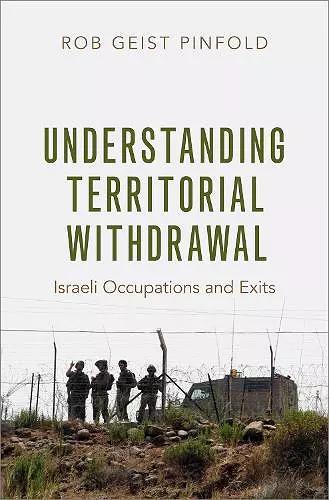Understanding Territorial Withdrawal
Israeli Occupations and Exits
Format:Hardback
Publisher:Oxford University Press Inc
Published:30th Jun '23
£51.30 was £57.00
Supplier delay - available to order, but may take longer than usual.

From Ukraine to Afghanistan and beyond, occupations and exit dilemmas permeate contemporary geopolitics. However, the existing literature on territorial conflict rarely scrutinizes a pivotal, related question: what makes a state withdraw from an occupied territory, or entrench itself within it? In Understanding Territorial Withdrawal, Rob Geist Pinfold addresses this research gap. He focuses primarily on Israel, a unique but important milieu that offers pertinent lessons for other states facing similar policy problems. As Pinfold demonstrates, occupiers choose to either perpetuate or abandon an occupation because of three factors: their relations with the occupied, interactions with third parties, and the occupier's domestic politics. He argues that each withdrawal is the culmination of a gradual process of policy re-assessment. Critically, it is a combination of local violence and international pressure that causes popular and elite opinion within the occupier to endorse an exit, rather than perpetuate the status quo. To affirm this pattern, Pinfold constructs a generalizable framework for understanding territorial withdrawal. He then applies this framework to multiple case studies, which include: Israel's withdrawal from the Sinai Peninsula between 1974-1982; its "unilateral" withdrawal from southern Lebanon in 2000; and its "unilateral disengagement" from the Gaza Strip in 2005, as well as Israel's non-withdrawals from the West Bank and Golan Heights. Overall, Understanding Territorial Withdrawal delineates commonalities that manifested in each exit yet were absent in the cases of occupation without exit. A powerful analysis of a central concern for the study of international security, territorial conflict, and the Arab-Israel conflict alike, this book provides a critical intervention that identifies why occupiers either retain, or leave, occupied territory.
Understanding Territorial Withdrawal is a vital contribution to the literature on military occupations. Pinfold offers a careful, well-reasoned, and provocative analysis of why some military occupiers choose to withdraw while others only become further entrenched. This is a must-read for students of military occupation and intervention. * David Edelstein, Professor of International Affairs and Government, Georgetown University, and author of Occupational Hazards: Success and Failure in Military Occupation *
Why do some military occupations end while others persist? Pinfold's penetrating study offers unique insights into this important question. Drawing primarily on the experiences of Israeli military occupations, Understanding Territorial Withdrawal provides a much-needed analytical framework for appreciating the factors that inform these critical strategic choices. * Richard Caplan, Professor of International Relations, Oxford University, and author of Exit Strategies and State Building *
With so much written on how Israel has held on to occupied territory, it is refreshing to have a book which also examines those cases in which it did withdraw. Understanding Territorial Withdrawal is rich and informative, demonstrating that it is the interplay between domestic and international political considerations that determines when an occupation ends. * Lawrence Freedman, Emeritus Professor of War Studies, King's College London *
Understanding Territorial Withdrawal is a welcome addition to existing debates over Israel's treatment of conquered territory. The book expertly weaves analysis of the domestic, bilateral, and international arenas. In so doing, it demonstrates how decisions about withdrawal are driven by the strategic and ideational benefits of holding onto conquered territory, compared to the costs imposed by bilateral violence and international opposition. * Nadav Shelef, Harvey M. Meyerhoff Professor of Modern Israel Studies and Political Science, University of Wisconsin, Madison *
Pinfold's research into Israel's history of territorial occupation and withdrawal is a much-needed piece of scholarship. Not only does Understanding Territorial Withdrawal highlight the complexity of Israel's territorial strategies, but it also illustrates why Israel has exited from some territories, but not others. Further, the book demonstrates how Israel's experience can provide lessons for other states and occupied lands. * Monica Duffy Toft, Professor of International Politics and Director of the Center for Strategic Studies, Tufts University *
It will appeal especially to political scientists and historians interested in state security policy and Middle Eastern politics...Recommended. Advanced undergraduates through faculty. * Choice *
Rob Geist Pinfold's Understanding Territorial Withdrawal: Israeli Occupations and Exits, is a timely contribution to the scholarly literature on territorial conflict and conflict resolution. * Ariel Zellman, Global Policy Opinion *
Understanding Territorial Withdrawal is a robust analysis of Israeli foreign and defense policy. * Tami Amanda Jacoby, Israel Studies Review *
The author illustrates the ways in which politics in the occupying power affects the decision to withdraw or to remain. In comparisons with other countries, he demonstrates how occupation and exit are framed and contested domestically. * Natan Aridan, Israel Journal of Foreign Affairs *
Understanding Territorial Withdrawal examines the politics of Israel's occupations and "exits" through case studies of the Sinai Peninsula, Lebanon, Gaza, the West Bank, and the Golan Heights. The comparative analysis considers each of these occupations individually and highlights the linkages between them. * Nathaniel Shils, Middle East Policy *
Excellent book. * Raphael D. Marcus, Routledge *
ISBN: 9780197658857
Dimensions: 162mm x 237mm x 28mm
Weight: 599g
344 pages